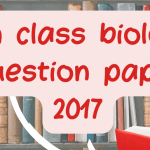B.Ed Question Paper 2021 PDF
B.Ed question papers from 2021 include essential questions and answers covering various subjects. This helps students understand key concepts, prepare effectively, and excel in exams. Below are subject-wise questions and answers designed to guide students through their preparation.
Teaching and Learning
Question: What is the difference between teaching and learning?
Answer: Teaching is the process of imparting knowledge, while learning is the process of acquiring it. Teaching involves a teacher’s role, whereas learning focuses on the student.
Question: Define pedagogy and its significance.
Answer: Pedagogy is the art and science of teaching. It is significant because it provides strategies and methods to enhance teaching effectiveness.
Question: What are the characteristics of an effective teacher?
Answer: An effective teacher is knowledgeable, patient, creative, empathetic, and skilled in communication and classroom management.
Question: Explain Bloom’s Taxonomy in education.
Answer: Bloom’s Taxonomy categorizes educational goals into six levels: knowledge, comprehension, application, analysis, synthesis, and evaluation.
Question: What is the importance of lesson planning?
Answer: Lesson planning ensures organized teaching, clear objectives, and effective use of time, helping students achieve learning goals.
Question: How does collaborative learning benefit students?
Answer: Collaborative learning encourages teamwork, communication, and critical thinking skills among students, making the learning process more engaging.
Question: What is differentiated instruction?
Answer: Differentiated instruction tailors teaching methods to meet individual students’ needs, ensuring effective learning for diverse learners.
Question: Define formative and summative assessment.
Answer: Formative assessment evaluates student learning during instruction, while summative assessment measures learning at the end of a unit or course.
Question: Why is student feedback important?
Answer: Student feedback helps teachers understand learning gaps, improve teaching methods, and create a better learning environment.
Question: Explain the concept of constructivism in education.
Answer: Constructivism is a learning theory that emphasizes the active role of learners in constructing their understanding through experiences.
Question: What is classroom management?
Answer: Classroom management involves strategies and techniques to maintain a productive learning environment and minimize disruptions.
Question: How can technology enhance teaching?
Answer: Technology enhances teaching by providing interactive tools, resources, and platforms for personalized and engaging learning experiences.
Question: What are teaching aids, and why are they important?
Answer: Teaching aids are materials used to support teaching, such as charts, videos, and models. They make lessons more understandable and interesting.
Question: Define experiential learning.
Answer: Experiential learning is learning through experience, involving hands-on activities and reflection to understand concepts deeply.
Question: What is the role of a teacher in inclusive education?
Answer: Teachers in inclusive education adapt teaching methods to meet diverse needs and ensure all students feel valued and supported.
Question: Explain the concept of flipped classrooms.
Answer: In flipped classrooms, students study lessons at home and practice problem-solving in class, fostering interactive learning.
Question: What is the importance of co-curricular activities?
Answer: Co-curricular activities develop students’ social, emotional, and physical skills, complementing academic learning.
Question: How can teachers promote critical thinking?
Answer: Teachers can promote critical thinking by encouraging questioning, problem-solving, and analyzing situations from multiple perspectives.
Question: What is inclusive education?
Answer: Inclusive education ensures that students of all abilities learn together in a supportive and accommodating environment.
Educational Psychology
Question: What is educational psychology?
Answer: Educational psychology studies how people learn, focusing on teaching methods, student motivation, and learning processes.
Question: Explain Piaget’s theory of cognitive development.
Answer: Piaget’s theory outlines stages of cognitive development: sensorimotor, preoperational, concrete operational, and formal operational.
Question: What is motivation in education?
Answer: Motivation in education refers to the internal drive that stimulates students to learn and achieve academic goals.
Question: Define operant conditioning and its educational implications.
Answer: Operant conditioning involves behavior modification through reinforcement and punishment, influencing student behavior and learning.
Question: What is emotional intelligence, and why is it important?
Answer: Emotional intelligence is the ability to understand and manage emotions, essential for building relationships and self-awareness in learning.
Question: Explain Vygotsky’s concept of the Zone of Proximal Development (ZPD).
Answer: ZPD is the difference between what a learner can do independently and with guidance, highlighting the role of support in learning.
Question: How does memory affect learning?
Answer: Memory helps retain and retrieve information, playing a crucial role in understanding, problem-solving, and academic performance.
Question: What is self-efficacy in education?
Answer: Self-efficacy is a student’s belief in their ability to succeed in specific tasks, influencing their motivation and learning outcomes.
Question: Describe Maslow’s hierarchy of needs.
Answer: Maslow’s hierarchy outlines human needs in five levels: physiological, safety, love/belonging, esteem, and self-actualization.
Question: What is the role of reinforcement in learning?
Answer: Reinforcement strengthens desired behaviors, increasing the likelihood of their repetition in the future.
Question: Define transfer of learning.
Answer: Transfer of learning is applying knowledge or skills from one context to another, essential for problem-solving and adapting.
Question: What is the importance of play in child development?
Answer: Play fosters cognitive, social, and emotional development, helping children learn through exploration and imagination.
Question: Explain Gardner’s theory of multiple intelligences.
Answer: Gardner’s theory identifies different types of intelligences, such as linguistic, logical-mathematical, spatial, and interpersonal.
Question: What are learning styles?
Answer: Learning styles are individual preferences for processing information, such as visual, auditory, or kinesthetic methods.
Question: What is observational learning?
Answer: Observational learning occurs by watching others, involving imitation and modeling of behaviors.
Question: How does anxiety affect learning?
Answer: Anxiety can hinder concentration, memory, and problem-solving abilities, negatively impacting academic performance.
Question: What are the stages of moral development according to Kohlberg?
Answer: Kohlberg’s stages include pre-conventional, conventional, and post-conventional levels, focusing on ethical reasoning.
Question: Define intrinsic and extrinsic motivation.
Answer: Intrinsic motivation comes from internal satisfaction, while extrinsic motivation is driven by external rewards or pressures.
Question: What is scaffolding in education?
Answer: Scaffolding provides temporary support to students, gradually reducing assistance as they become more competent.
Question: How do peer relationships influence learning?
Answer: Peer relationships affect learning by providing emotional support, collaborative opportunities, and exposure to diverse perspectives.
Latest Posts
- Step-by-step guide to download and apply for jee mains admit card 202
- Comprehensive 2025 government holidays and recruitment details for job seekers
- JEE Mains Admit Card 2025: Your Step-by-Step Guide to Downloading the Hall Ticket
- Everything You Need to Know About 2025 Government Holidays Recruitment
- Comprehensive Guide to rrb d group recruitment 2025 – Eligibility, Vacancies, and Application
- Detailed guide to nps trust recruitment 2025 vacancies, eligibility and apply process
- Comprehensive guide to hpcl recruitment 2025 notification, vacancies, and application process
- ignou bed admission 2025 complete recruitment guide with eligibility and process
- Comprehensive Guide to Indian Army Agniveer Recruitment 2025 Notification and Jobs
- Everything You Must Know About CBSE Board Exams 2025 Changes & New Rules






